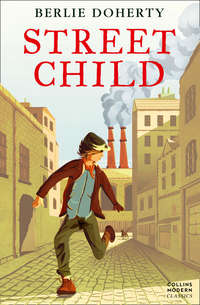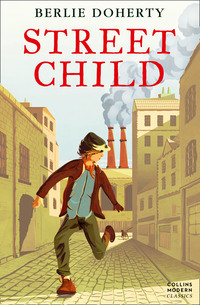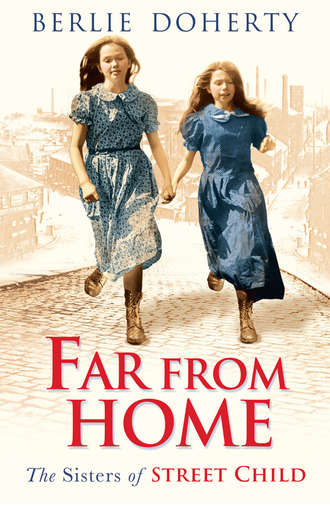
Полная версия
Far From Home: The sisters of Street Child
At last Rosie came back down carrying the tray. “Look at this! All gone!” she said. “Judd said he didn’t say nothing, but he couldn’t take his eyes off your bread! His nostrils were twitching as if he was sniffing roses!”
She put the tray down, and Emily took the plates over to the sink immediately to wash them. Why didn’t I think of doing that? Lizzie wondered.
“He’s out for the day soon, so we can breathe clear, but Judd tells me he’s bringing a business acquaintance back with him this evening. She’s got to show the Lazy Cat how to get a room ready for him, so I’m to do the shopping today. He wants steak and kidney pie for supper. I’ll do the meat, cos I love doing that, and Em’ly, you can have a go at the pastry because your ma’s was always a dream. Oh, good girl, you’ve put more water on. Let’s have breakfast, and then you and I can go together for the meat, Em’ly. Would you like that?”
“Oh, I would!” said Emily.
Lizzie forced herself to stand in front of Rosie. “What can I do?” she asked timidly.
“What can you do, my love? What can you do, that’s the trouble. Ah, I know. You can take the Dearies their breakfast. They’ll be awake soon. That’s a job I hate, and the Lazy Cat can’t stand them, but you might like it. It’ll cheer them up to see a pretty little girl like you. You can get the tray set now. Tea, bread and butter. Sometimes a bit of marmalade. That’s all they ever have.”
“How many Dearies are there?” Lizzie asked. She wiped his lordship’s tray carefully and reached up to the shelf for clean plates.
“Two of course. His mother and hers.”
“What if they tell his lordship about me?”
“They won’t,” Rosie chuckled. “They forget everything five minutes after it happens, bless them. And even if they did tell him, he’d think they’d made it up.”
I’ll do it so well, Lizzie told herself, that Rosie will decide she wants me to do it every day, and she’ll speak for me. She set the tray carefully with china cups and saucers, plates, teapot.
“Shall I do the bread and butter for you?” Emily asked.
“No. I want to do it myself,” Lizzie insisted, but Rosie watched anxiously as she sawed at the loaf, tearing off a huge wedge.
“They’ll never be able to chew a piece that big. Let me cut it nice and thin for them, and you can have that piece as an extra treat.”
Emily started to sweep Lizzie’s breadcrumbs up, and Lizzie snatched the broom away from her. “I know how to sweep the floor! I did it yesterday, remember?”
Emily shrugged and caught Rosie’s eye. “She’s always like this. Ma used to call her Little Miss Independent.”
“And there’s nothing wrong with that,” Rosie said. “Sisters are s’posed to help each other though, Lizzie. Let brothers do the fighting.” They heard the upstairs door closing and saw a pair of feet walking past the window. “That’s him gone. It’s a wet day, and the streets will be muddy, so his boots will need a jolly good clean when he gets back.”
“I’ll do them,” said Lizzie.
“And they’re huge. He’s got feet like barges. The Crocodile’s the same; always huge, muddy boots to clean, or dusty ones to shine, every single night. Why they can’t spend a day in the house and give their feet a rest, I don’t know. No, they must go out, whatever the weather.” She poured boiling water into the pot and left Lizzie to set milk and sugar next to it. “There you go, Lizzie. There’s their bell too, just on time! The Dearies are ready for their breakfast, and breakfast is ready for the Dearies. Up the stairs, turn right, up the next stairs, first door on your left. Don’t wash them, Lizzie. That’s the Lazy Cat’s job, not yours. Come on, Em’ly. We’ll catch the butcher nice and early for the best cuts if we hurry.”
“Not nervous, are you?” Emily paused as she was picking up her warm cloak, watching Lizzie. She knew how her sister was feeling, with her pale face set in that determined way and her mouth drawn into a thin, tight line. She also knew that Lizzie was determined to do the job as well as she possibly could, for Ma’s sake, and that nothing, not even fear of his lordship himself, would stop her. “Good luck, Lizzie,” she said. She swung her cloak round her shoulders and followed Rosie out of the door.
Lizzie waited till the sound of their footsteps had gone before she dared to lift up the tray. “Up the stairs, turn right, up the next stairs, first door on my left. No, right. No, left. I’m sure it’s left. And I’ll do it so well that Rosie will speak for me.” She took a deep breath and edged her way out of the kitchen door and up the dark stairs.
Lizzie was so nervous that the cups rattled in their saucers like old bones. The door at the top of the servants’ stairs was closed. She lowered the tray down onto the top step and everything tilted dangerously sideways; the cups slid, the cutlery rolled, the tea slurped out of the spout of the pot. She held the tray firm with her shoe pressed against it because the step was so narrow. She didn’t want it tipping down the stairs. She turned the knob and pushed open the door, but as soon as she bent down to pick up the tray, the door swung shut again. She tried again, and the same thing happened. She was close to tears. “I could try holding it with one hand, like Rosie does,” she thought. “But I might drop it, and then what?” She decided that the only thing she could do was to get herself through the door first. She opened the door, stepped over the tray onto the landing, nearly dislodging it as she did so, and then crouched down so she was wedging the door open with her body. She leaned down, carefully lifted up the tray, and almost overbalanced. She was panting with effort and triumph when at last she managed to stand up and turn round. And there was Judd, arms akimbo, staring at her in amazement.
“What on earth is going on?” she demanded.
The contents of the tray chattered like loose teeth. “I’m taking the Dearies their breakfast.”
“Don’t you dare refer to them as the Dearies! They’re Mistress Rickett and Mistress Whittle. And you’re late. Get on with it, keep quiet, and don’t go into any room but theirs. Quick!”
A round pasty face appeared from another doorway behind Judd. The Lazy Cat! Lizzie thought. Well, I’ll show her how well I can do my job. Better than she can, any day. Judd stepped away, and Lizzie saw now that the hallway was glowing with colour: flowery wallpaper and carpet, red velvet chairs and curtains, a crystal chandelier gleaming with teardrops like a rainbow. It was not at all like the dingy kitchen down below stairs.
“What are you waiting for?” said Judd. “They won’t want cold tea, you know.”
The carpet was as soft as grass under Lizzie’s feet. At the top of the stairs she paused again. She had completely forgotten which way to go. The first door, but was it on the left or the right? There were six doors on the landing, and all of them were closed. She daren’t go back down again, daren’t face Judd’s wrath and the Lazy Cat’s scornful smile. Something told her it would be bad manners to call out. She put the tray down on a polished table and stood outside the first door on the right. I’m sure it was this one, she thought. She could hear nothing from inside. She knocked timidly, then more bravely. Still nothing. She turned the knob slowly and peeped inside. In front of her was a bed with a beautiful fringed quilt over it. Standing round the walls were huge pieces of dark wood furniture. There was a standard lamp with a fringed shade, and long, thick green curtains at the windows. But no Dearies. She closed the door softly. Her heart was thumping.
She crept to the door on the other side of the staircase, listened again, and now she could hear the mumble of voices. She knocked softly.
“Knock, knock!” called a voice from inside. “Tea, lovely tea!”
Lizzie opened the door, went back for the tray, and crept into the room. Facing her was a big iron bed with two old ladies sitting bolt upright in it. One had lost her nightcap, and her thin grey hair hung in long strand like cobwebs round her face. She clapped her hands together with delight. “Tea, Mistress Rickett! Tea!”
Mistress Rickett glared at Lizzie with round, pebbly eyes. “Who is it, Mistress Whittle?”
“Please, miss. Please, miss,” said Lizzie, glancing from one to the other and trying to bob a curtsy without dropping anything, “I’ve brought your breakfast.”
“Move over, Mistress Rickett,” the cobwebby one said. She patted a space clear on the counterpane that covered the bed. “Put the tray down. My mouth’s as dry as a desert. Look!” She poked out a yellow tongue.
“Who is it?” Mistress Rickett asked again.
“The tea girl. Pour it out, now! I’m parched.”
With shaking hands Lizzie did as she was told. She held out a rattling cup and saucer to each of the Dearies, then stood back, watching them sip their tea. She didn’t know whether she was supposed to go or stay. At last Mistress Whittle slurped her way to the bottom of her cup and handed it back to Lizzie.
“Pour me another. Plenty of sugar this time. Put some marmalade on my bread. Poke the fire. Open the curtains. Pour me some more tea.” Every so often the orders came, while the two Dearies worked their way through the tea and the bread and marmalade. But worst of all, definitely worst of all, was when the cobwebby one lifted up the counterpane and thrust out her skinny legs.
“Wash us.”
“Brush our hair,” giggled Mistress Rickett.
“Put us on the commode.”
I’ll do it, Lizzie thought grimly. Even though she knew it was not her job. I’ll do it so well that Judd will think I’m better than the Lazy Cat.
At last the Dearies were put back into bed, hair brushed and plaited (which Lizzie quite enjoyed doing), pillows plumped, fire blazing, teapot completely empty, all the bread and marmalade gone. Lizzie had spent all morning with them, and there’d been no sign at all of the Lazy Cat. She could hear her stomach rumbling and realised that she hadn’t eaten anything herself yet.
“Is there anything else?” she asked.
“Have you brought tea?” Mistress Whittle asked brightly.
“Who is it?” Mistress Rickett asked. But her eyes were closing, her head sinking back against the pillow. Mistress Whittle looked round at her, tried to nudge her awake, and yawned. She smiled sleepily at Lizzie.
Lizzie tucked the counterpane round them, picked up the tray, and tiptoed out of the room. “Please don’t wake up,” she whispered. “I’m famished!”
She went quickly down the stairs. No Judd. No Lazy Cat. She opened the door to the servants’ quarters and stepped down with a sigh of weary relief. The door swung shut behind her, knocking her so hard that she dropped the tray, sending it and everything on it clattering down the stone steps. Every piece of crockery was broken.
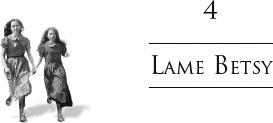
Emily enjoyed her visit to the butcher’s with Rosie. The early drizzle had lifted; the day was blue and sharp. Already the street sellers were singing out their wares: “Fresh watercress!” “Nutmeg graters!” “Pies, all ’ot!” “Muffins and coffee!” Street boys held out their hands: “Spend a penny on a poor boy! No Ma, no Pa! No nuffin’!” Rosie hurried past them all, intent on reaching her favourite butcher’s shop before the best cuts of meat had gone. As they drew near the shops, the streets became muddier, churned up by the wheels of carriages and donkey carts. Little sweepers ran in front of the wealthier looking shoppers to clear a path for them through the muck. They didn’t bother with Rosie and Emily; they knew they wouldn’t be getting any coins from them. Now Emily could see that the gutters were running red with blood. A woman walked past them, bent almost double with a whole sheep slung across her shoulders, heading for the row of butchers’ shops. Carcasses of meat hung from the rafters of the shop awnings. The owners, all dressed in butcher’s blue, stood outside, shouting out to people to come and buy from “Me, the best butcher in the whole of London town!”
Rosie led the way to the last shop in the row, where the walls were covered in shiny white and blue tiles. Inside, a whistling boy swept the floor clean of blood drips and slopped pieces of fat and bone. Hungry dogs scavenged under the trestles that had been pulled out in front of the shop, and were kicked away by the butcher’s hefty boot.
The butcher knew Rosie well, and joked and bartered with her as she talked Emily through the best cuts to buy. He parcelled her purchases up with paper and put them into her basket. “It’s people like you who make me a poor man!” he grumbled, as she handed over the coins. “Don’t let anyone know I’m selling you meat at this price!”
She turned away, pink-faced and smiling. “He knows I was in the trade myself once,” she said to Emily. “Selling whelks and stuff for my granddad. He was so pleased when he heard I’d got a job for his lordship that he gave me a bag of stewing meat for nothing! We’ll just get some nice fresh veg now, and we’ll have just about done. Back to our baking, Em’ly!”
They hurried on to another stall and chose the vegetables to go with his lordship’s dinner. Emily looked longingly at a nearby pedlar’s tray of dangling coloured ribbons. I wish I could buy a lovely red one for Lizzie, she thought. One day, when I get some wages, I’ll buy her one. She lifted a strand between her fingers, loving its silkiness and its intense colour of summer poppies.
“Don’t daydream, Em’ly,” Rosie said. “There’s never time for that. Judd will be waiting for me to hand back her purse so she can count out her change. I have to account for every farthing spent, so don’t go mooning over bits of ribbon.”
“It wasn’t for me,” Emily said. “For Lizzie. Or Ma.” Her voice trembled. She ached when she thought about Ma, all her prettiness gone, thin as a helpless bird that had forgotten how to fly. Be safe, Ma!
As soon as they arrived back at the Big House and hung up their cloaks behind the door, Judd flounced downstairs with the Lazy Cat to inspect the meat. She nodded to show she was satisfied, then tipped out the contents of the purse and counted the coins. “You got a bargain,” she muttered. “You shop better than you cook, I’ll say that for you. Now, before you start the meal, I want logs chopping and more coal fetching to the upstairs fires. The chimney’s drawing fast today. We don’t need a kitchen girl, Rosie Trilling, we need a fine strong boy. I keep telling Mr Whittle that, but he doesn’t want to be told how to spend his money.”
Emily’s hopes fell. “I can chop wood,” she offered, but Judd just snorted. “You’re little more than a twig yourself. Rosie’s the strong one. She can chop, you can carry, and I want it done now. What happened to the other child?”
And it was at that very moment that Lizzie had dropped the breakfast tray down the stairs. The clatter of china splintering from step to step made all three of them jump like rabbits. Judd pulled open the kitchen door to find a heap of broken china, gobs of butter and cutlery on the bottom step and a heap of crying child on the top one. The Lazy Cat stood behind her, smirking with delight.
“Rosie Trilling, you will pay for the breakages out of your wages,” Judd said, very quietly. “And make no mistake about it, these Jarvis girls will have to go.”
She lifted her black skirt clear of the mess of broken breakfast remains and swept on up the stairs, followed by her grinning niece. They stepped over Lizzie without even looking at her.
“Come on down,” Emily called up to her sister. “I’ll sweep up the bits. Come on down, Lizzie.”
Lizzie crept down the stairs, hiccupping. She wouldn’t look at Rosie. She wouldn’t look at Emily, who was still flushed and bright from her visit to the butcher’s. She had let them both down. She had let Ma down. She ran past them both and opened the kitchen door into the fluster of the hen yard. The back gate was open ready for a delivery of milk. She ran up the steps and into the road and, blind with tears, straight across the path of the milk cart. The horse reared up in fright, and the woman driving the cart was nearly tipped sideways onto the muddy street.
“Stupid girl! Stupid child!” the woman shouted. “You nearly killed Lame Betsy! And my horse! You nearly lost me all my milk!”
Lizzie ran on till she came to a row of black railings and clung to it, exhausted and frightened. Behind her, she heard a bird singing in a cage. She remembered now pausing in that very place with Emily and Ma and Jim on their way to the Big House. Was that only yesterday? Ma had told them she was taking them to the only friend she had in the world, to ask for help. She had asked them to be good and they had promised her they would. And what had Lizzie done? She had broken china that Rosie would have to pay for, and she had nearly killed the milk woman.
She sank down and curled herself up with her arms round her knees, not knowing what on earth to do next. Maybe she should find her way to the workhouse, and ask to be taken in. Everybody said it was a terrible place, and that there was no hope left for anyone who went there. But what if Ma had been taken there with Jim? She might find them there, be able to stay with them. Surely that would make it bearable, if they were there. And if she wasn’t at the Big House being a nuisance, Judd might take pity on Emily and let her stay on and help Rosie, and everybody would be happy. How would she get there, and was there more than one? She had no idea. If she stayed here long enough, someone might scoop her up and take her to the workhouse anyway. Or if they didn’t, she could beg. She watched a filthy, ragged boy approach a woman, hold out his hand to her, then touch his mouth to show her he was starving. The woman walked past him as if she couldn’t see him.
I still haven’t had my breakfast yet, Lizzie thought. But I’m not starving, not like him. Not yet. What must it be like to be like him, to have nobody to look after you, no mother or father, nobody? Nowhere to live? And the streets are full of starving children, that’s what people say. Like vermin, they are. Rats.
She sank her head into her arms. She could hear the whinnying of passing horses, the clop and clap of their hooves. London was busy around her, everyone was going somewhere, but she had nowhere to go. Then she heard a woman’s voice, shouting, “Girl! Girl! You!” She looked up, and there was Lame Betsy the milk woman limping across the road, waving her arms to force the carriages to make way for her. She wore a large black boot on one foot, and a much smaller one on the other, and as she walked she dragged the muck of the road behind her with her lame foot. Lizzie scrambled up to dart away, but Lame Betsy grabbed her by the shoulders and forced her to sit down again on the low wall in front of the railings. Then, with a huge harrumphing effort, she sat herself down next to her.
She let her wheezing breath steady a bit, still holding tight to Lizzie’s arm to stop her from running off. “I want to know,” she said, “why a young girl like you was dashing across the road like that as if she had no eyes to see with and no ears to hear with.” She glared at Lizzie. “Seems to me like you’re in trouble. Is that right? Really big trouble.”
“I am. I broke two cups and saucers, and two tea plates and a teapot.”
The milk woman let out a sigh like the blurt a horse makes through its nostrils. “And that’s enough to make you nearly kill Lame Betsy, is it? And her horse, and yourself? Is it?”
Lizzie shrugged. She thought it probably wasn’t.
“So is you running away because you’s frightened?”
Lizzie bit her lip. Yes, she had been frightened of the two Dearies. She was frightened of Judd. She had been terribly frightened when she had dropped the tray down the stairs; she could still hear the echoing shriek and clatter it had made, the terrifying din of shame. But that wasn’t everything she was frightened of, and she couldn’t find the words to tell Lame Betsy any of it, so she shook her head.
“Let me tell you something. You only run away when things are so bad that you can’t go on living in that place no more. I should know. When I was your age I ran away from a dad what beat me, and a ma what drank herself senseless. Is it that bad for you?”
Lizzie shook her head.
“And if you go back to that place, is there no one there what’d be glad to see you? Cos if you just glance over the road, you’ll see two people coming along what seems to be looking for someone. There’s a cook from a big house who I just happens to know is the kindest person on God’s earth, and she’s got a person with her who’s pretty enough to be your own sister.” Lame Betsy let go of Lizzie’s arm. “You’ve got a choice, girl. You can carry on running, or you can go and tell them you’re sorry for what you did.” She grabbed a railing and hoisted herself up. “Me, I’ve got to go and find Albert before he trots home all by himself with no milk delivered.”
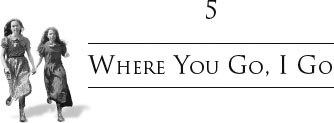
As soon as Lizzie stood up, Emily spotted her across the traffic of wagons and horses. “She’s there, Rosie! She’s safe!”
They threaded their way across the road and Emily hugged her sister as if she hadn’t seen her for a week; tight, tight, just as Ma used to do. “Never do that again,” she whispered. “Never run off without me, Lizzie.”
“My word, you gave us a fright. We thought you was lost for good. London is like a maze, girl. We could have been looking for hours,” Rosie said. “And, if Judd knows I’ve left the kitchen without her permission she’ll have me hung, drawn and quartered. It’s all my fault too. I should never have sent you up to the Dearies. They got you all jittery, I’ll be bound. And I should have warned you about that door. I’ve got the trick of it now, and so has Judd, but it comes shut on you like a charging bull if you don’t step out of the way quick enough.”
“But I broke all that china, and Judd said you’ve got to pay for it.”
“Poof! They never get given the best china, as Judd well knows, because they’ve got a habit of chucking it at the wall if the tea’s too hot or too cold or too weak or too strong. They must have it just right, or they just hurl it across the room! We keep a good stock in for them and we pick it up cheap in the market when we see it. Come on, girls, let’s get back, shall we?”
She hurried away, leaving Emily and Lizzie to try to keep up with her.
“What are the Dearies like, really?” Emily asked. “The dreary Dearies!”
“Ghosts and skeletons!” Lizzie giggled, making her voice wobble. “Who is it? Give me more tea. Who is it?” She skipped along, happy now. She was with Emily again, and nobody had told her off for anything. “More tea!”
Rosie turned round on her suddenly, her face snapped shut with anger. “Don’t you go making fun of the Dearies. They’re old, is all, a pair of old dears, and they can’t help that. And we’ll all be like that one day, even you, if you don’t keep barging into cart horses.”
Emily clasped Lizzie’s hand. “Don’t worry about Rosie. She’s upset,” she mouthed. “She should be busy in the kitchen by now.”
They had almost reached the Big House when a smart black and gold carriage drew up close to the main door. A liveried driver jumped down to open the carriage door, and two very tall women climbed out, dusting themselves down and complaining loudly that he had jolted them about like sacks of turnips. Two other women climbed out after them, clutching carpetbags as the driver handed them down from the back.
Rosie turned abruptly and put out her hands to stop the girls from going any further. She lowered her head. “Lor, oh lor, it’s the two mistresses. They weren’t due back till next week. Don’t look at them, whatever you do don’t let them notice you,” she hissed. “Turn round and go back. Have they gone inside yet?”


